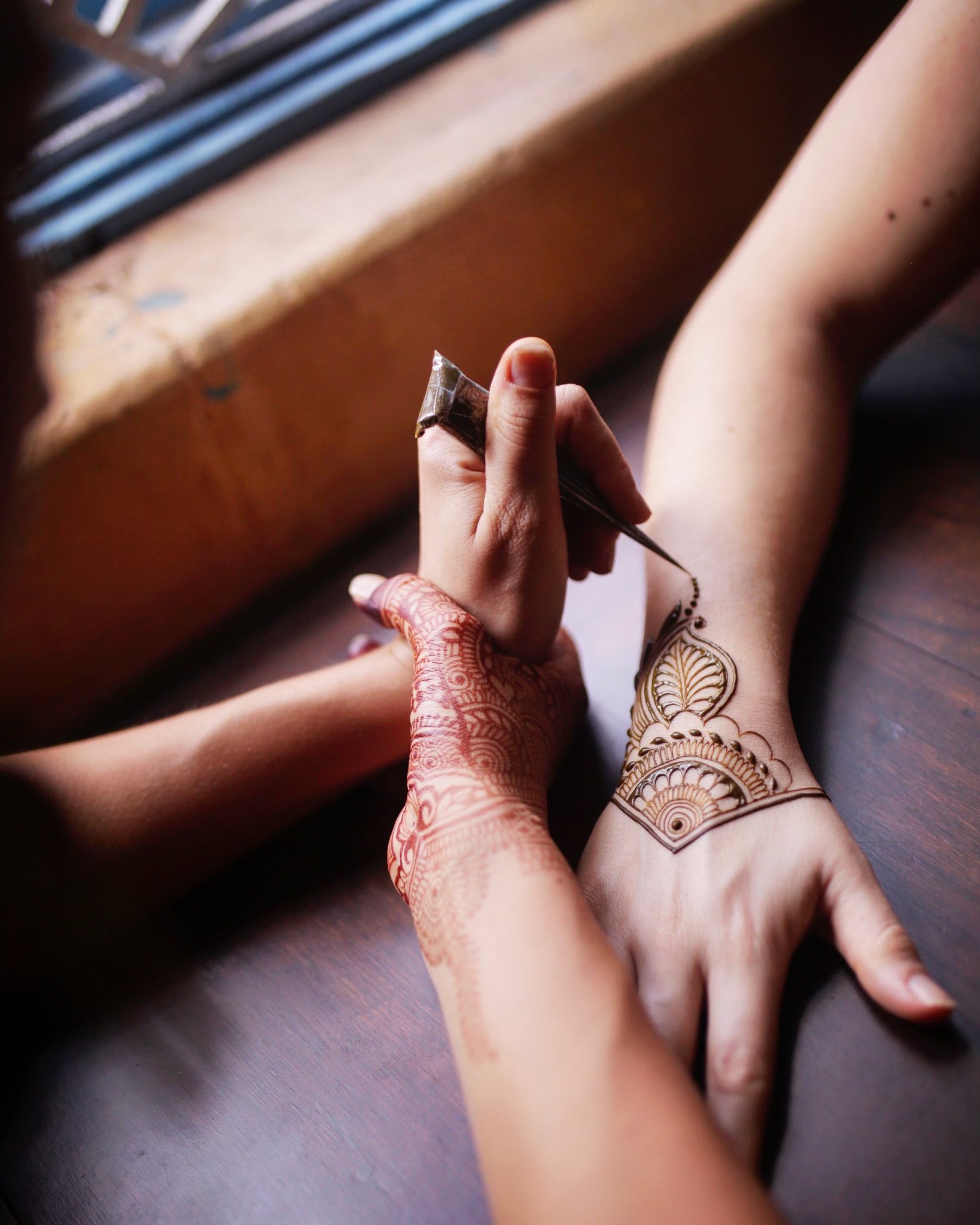What is Henna?
Short answer: Henna is a plant!
Botanically known as "lawsonia inermis" the henna plant is a small shrub native to North Africa. The leaves from the shrub are harvested, dried, ground and sifted into a fine powder. This powder is later mixed into a paste and applied to the skin. Henna contains a natural dye known as "lawsone" that binds to the skin cells on the top layer of skin crating a stain. Henna is also commonly used as a dye for hair and nails.
How do I prepare for my appointment?
Book your henna appointment 1-2 days prior to the event you are attending.
All waxing, manicure, and pedicure should be done 1-2 days before having henna applied. Skin should be clean and free of hair, lotion and oils as they create a barrier from henna to skin. (No spray tans please)!
Shower before your appointment. You will want to avoid water for 24 hours after getting henna applied.
Wear something comfortable that will look nice in the background if you wish to take photos of the freshly applied design.
Catch up on emails, texts and phone calls before your appointment. Having henna applied is a very relaxing and meditative experience, the less distractions the better.
how long does henna last?
Henna stains usually last around 10-14 days. This can vary greatly based on how long you have left the henna paste on your skin, how well you followed aftercare instructions, placement on the body as well as personal body chemistry. Some of us just exfoliate faster than others!
Where can i apply henna?
You can apply henna anywhere on the body!
Henna will always stain darker and usually last longer on places such as hands and feet were the skin is naturally thicker.
Henna does not always take as well to other parts of the body but is safe to apply anywhere.
Why do people apply henna?
Henna is traditionally applied for celebratory occasions. One of the oldest known cosmetics, it has been used to adorn people thought the world for anything considered auspicious. Weddings and fertility are among the most common celebrations henna is used for. There is no limit to the reasons one might choose to decorate themselves with this timeless leaf, but most often it is a still moment to mark a special moment in time.
All about aftercare
Leave henna on the skin for as long as possible. For optimal results we recommend 4-8 hours or overnight.
As needed, apply a sealant of sugar-water or lemon-sugar on top of the dried henna design. This will keep every dot in place ensure the henna doesn't crumble off to quickly. (All bridal bookings proper sealant application will be provided by the artist)
To remove the dried henna paste DO NOT USE WATER! Gently pick off the henna with your fingernail or blunt object (credit card, butter knife, or spoon). If the henna is too sticky to remove, use coconut oil to soften the dried paste and white off with a paper towel.
Avoid contact with water for 24 hours while the henna is oxidizing. Getting the fresh henna stain wet will greatly inhibit it's ability to darken.
Getting henna is a great reason to take a day off from housework and the gym. Henna is a papering experience and for optimal color excessive sweating, scrubbing and exfoliants will deteriorate the henna stain.
is henna safe?
Natural henna is safe and non toxic. We take great care in mixing certified organic henna powder with a combination of lemon juice, tea, essential oils of lavender, cardamom, tea tree, and cajuput with a dash of maple syrup or sugar.
Prenatal Henna & Henna for Children
Henna is safe to use during pregnancy but for extra caution we mix a special batch of henna paste using only lavender oil as it has a softer smell and can be more gentle on the skin.
What is black henna? (There is no such thing!)
Set the footer background color. The color of the text in the footer will be automatically set to white or black depending on the lightness of the color you chose to ensure it is legible.
does henna come in DIFFERENT colors?
Because henna as body art is simply a paste made from henna leaves, the simple answer is, no, henna does not come in different colors. Natural henna does however change color thought the process of application. You will notice in some images of henna, the tester is raised from the skin and appears green or black. This is what henna looks like when it has been freshly applied to the skin. When this layer of henna paste is removed, the stain from the henna is bright or light orange. Natural henna goes though an oxidization period, 1-2 days after removing the henna paste, the stain darkens to a rich red/brown color. The shade of a henna stain may vary on the quality of henna, where on the body it has been applied, as well has personal body chemistry. You will always see henna stains getting the darkest on the palms of the hands, where as on the shoulder or back, the stain will always be significantly lighter. This is not an example of henna coming in two different colors, it is an example of how it realty differently on different parts of the body.
-Another example I like to use when explaining how henna doesn't come in different color; "Sure, you could ad something in to the henna paste, natural or not natural, to achieve a different color on the skin. This, however, is not henna. It is the color of whatever material you have added. Personally, in my work I do not like to use anything to stain the skin other than henna" -Bridgette Bartlett




